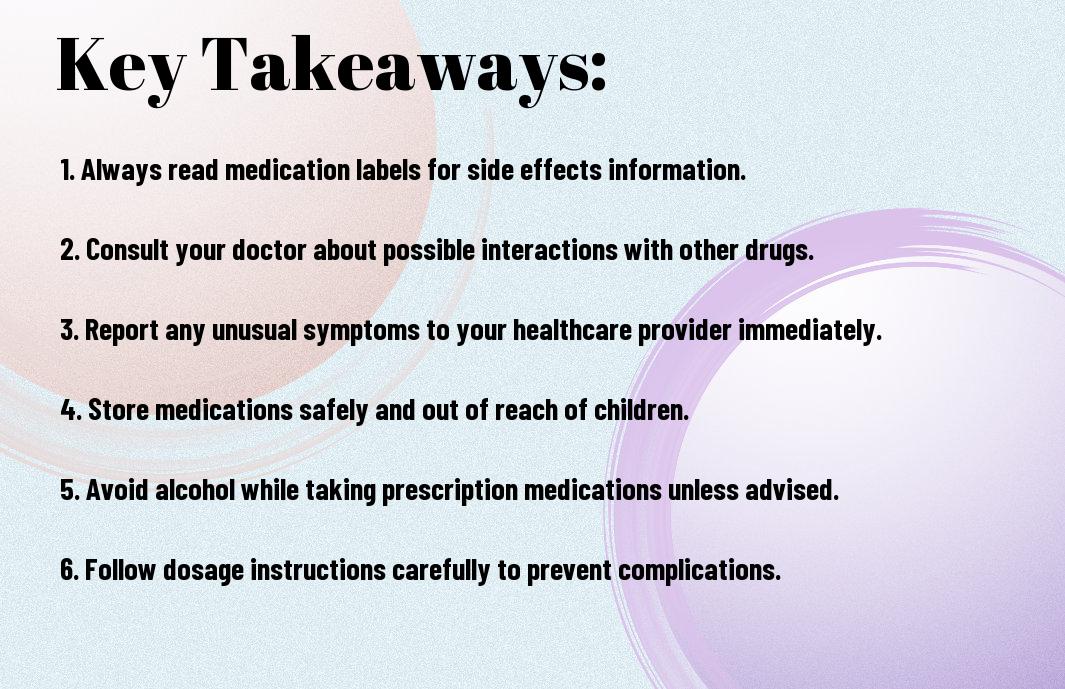There’s a vital need for you to understand the potential side effects of prescription medications. While they can effectively treat various conditions, these medications may also cause adverse reactions that impact your health. Being informed empowers you to identify any concerning symptoms early and communicate them with your healthcare provider. Additionally, awareness of drug interactions is crucial to avoid dangerous complications. Prioritize your well-being by staying educated on your prescriptions—your health depends on it.
Key Takeaways:
- Be aware of potential side effects and interactions with other medications that can impact health and safety.
- Always follow prescribed dosages and consult with a healthcare professional when experiencing any unusual symptoms.
- Keep an updated list of all medications and share it with your doctor to ensure safe prescribing practices.

Understanding Prescription Medications
To navigate prescription medications effectively, you must recognize their significance in treating various medical conditions. Each medication comes with specific instructions, dosage levels, and potential side effects. It’s imperative to understand how these medications can serve your health goals while also being aware of any risks involved. Taking the right steps will ensure your safety and effectiveness in managing your health.
Types of Prescription Medications
To comprehend the landscape of prescription medications, it is beneficial to identify the various types available:
- Antibiotics: Used to treat bacterial infections.
- Antidepressants: Aimed at managing mood disorders.
- Analgesics: Used to relieve pain.
- Antihypertensives: Help manage high blood pressure.
- Antineoplastics: Used in cancer treatment.
Perceiving these categories can guide your discussions with healthcare providers and inform your choices concerning health management.
| Type | Purpose |
| Antibiotics | Treat bacterial infections |
| Antidepressants | Manage mood disorders |
| Analgesics | Relieve pain |
| Antihypertensives | Control high blood pressure |
| Antineoplastics | Treat cancer |
How Prescription Medications Work
Medications are designed to interact with your body’s biological systems to produce desired effects. Each medication targets specific cellular mechanisms, influencing how your body functions. By altering the way chemicals interact in your system, these medications may alleviate symptoms or combat diseases. However, as they provide therapeutic benefits, they can also introduce side effects, some of which may be serious.
At the core, understanding how prescription medications work enables you to make informed choices regarding your health. Medications can interact with receptors to produce effects that range from reducing inflammation to managing your body’s chemistry. However, be wary of side effects that could range from mild discomfort to significant health risks. It’s crucial to maintain regular consultations with your healthcare provider to monitor these effects and ensure safe treatment. Your safety and health understanding should be active components of your medication regimen.
Common Side Effects
Any medication can affect individuals differently, leading to a range of side effects. Common side effects often include nausea, dizziness, fatigue, dry mouth, and digestive issues. By understanding these potential reactions, you can be better prepared to monitor your health and take appropriate action if necessary.
Overview of Common Side Effects
Effects of prescription medications can vary widely, impacting your daily life. For instance, while some may experience mild symptoms like headaches or drowsiness, others might encounter more severe reactions that could affect their overall well-being and quality of life.
Managing and Mitigating Side Effects
About half of those taking prescription medications may experience side effects. To manage these, consider maintaining open communication with your healthcare provider, who can adjust your dosage or prescribe alternatives. Additionally, implementing lifestyle changes such as proper hydration, diet adjustments, and physical activity can significantly reduce side effects.
At times, understanding how to manage side effects effectively can lead to a more positive experience with your medication. By adhering to your prescribed regimen and keeping your healthcare provider informed about any adverse reactions, you can work together to find solutions that better suit your needs. This proactive approach can help minimize discomfort and enhance the overall benefits of your treatment.
Risks of Polypharmacy
Keep in mind that polypharmacy, the simultaneous use of multiple medications, can significantly increase your risk of adverse effects and drug interactions. As the number of medications you take rises, so does the likelihood of experiencing complications, such as confusion, falls, and hospitalization. It’s vital to regularly review your prescriptions with your healthcare provider to mitigate these risks and ensure your treatment plan is both safe and effective.
Definition and Causes of Polypharmacy
Against a backdrop of chronic conditions and aging populations, polypharmacy often arises from multiple prescriptions written by different healthcare providers, sometimes without a comprehensive review of all medications. Factors like specialized treatment, over-the-counter drug use, and patients’ attempts to manage various symptoms also contribute to this phenomenon, leading to an increased risk of unintended consequences.
Effects of Multiple Medications
Effects of using multiple medications can vary widely, manifesting as mild to severe health issues. You may experience increased side effects, dangerous drug interactions, or complications like medication non-adherence. The accumulation of drugs in your system may lead to unexpected health outcomes that could compromise your overall wellness.
Hence, the implications of taking numerous medications extend beyond mere inconvenience. You can face cognitive impairment, increased fall risk, and even potential hospitalizations due to adverse drug reactions. Regular medication reviews with your healthcare provider are vital to ensure that your medication regimen is not only effective but also safe and free of unnecessary or harmful prescriptions, ultimately protecting your health and well-being.
Importance of Communication with Healthcare Providers
After you start taking any prescription medication, prioritizing communication with your healthcare provider is necessary. This ongoing dialogue helps you to clearly express any concerns, ask questions about your treatment plan, and understand how your medications affect your overall health. By maintaining open lines of communication, you can work together to optimize your treatment and ensure that you are both informed and safe.
Discussing Side Effects
Alongside your healthcare provider, it is vital to discuss any potential side effects associated with your prescription medications. Openly sharing your experiences of any adverse effects allows your provider to adjust your treatment if necessary, ensuring your safety and comfort. By actively engaging in these discussions, you contribute to a better understanding of the overall impact the medications may have on your health.
Informed Decision Making
Before beginning any new medication, taking an active role in your healthcare can help you make informed decisions. This means researching your medications, understanding potential side effects, and asking your provider specific questions related to your health needs. Engaging in informed decision making empowers you to take control of your health journey.
This approach also reduces the risk of serious side effects, as you can recognize symptoms early and seek appropriate help. Additionally, being aware of doses, timing, and interactions with other medications can enhance the effectiveness of your treatment. Ultimately, informed decision making leads to better health outcomes and empowers you to advocate for your well-being, ensuring you stay as safe and healthy as possible.
Safe Medication Practices
All individuals should adopt safe medication practices to minimize risks and enhance effectiveness. This includes understanding your prescriptions, using them as directed, and consulting healthcare providers for any questions or concerns. For comprehensive guidance, refer to Taking Medicines Safely as You Age, which emphasizes the importance of informed medication management.
Storing Prescription Medications Safely
Below is a key aspect of medication safety: always store your prescription medications in a cool, dry place, away from direct sunlight and humidity. Ensure they are kept out of reach of children and pets to prevent accidental ingestion. Consider using a locked cabinet for added safety.
Proper Disposal of Unused Medications
The disposal of unused medications is a vital step in preventing accidental overdoses and misuse. Always seek out local take-back programs or follow guidelines provided by your pharmacy or local authorities. Flushing medications can harm the environment, so opt for safer disposal methods whenever possible.
Storing medications properly ensures their effectiveness and safety. Discard any medications that are expired or no longer needed, as keeping them can lead to accidental misuse. Always return them to designated take-back locations or follow local disposal guidelines. By taking these simple steps, you can help protect yourself and others from the dangers associated with unused or expired medications.
Monitoring and Reporting Side Effects
Your health should always come first, especially when it comes to prescription medications. It’s imperative to monitor any side effects you experience and report them to your healthcare provider promptly. This vigilant approach can help ensure that any adverse reactions are addressed quickly, maintaining your overall well-being while on medication.
Keeping a Medication Log
Across your medication journey, maintaining a medication log can be incredibly beneficial. This log should include details about each medication, dosage, time taken, and any side effects observed. By keeping accurate records, you provide your healthcare provider with valuable information that can assist in adjusting your treatment plan effectively.
When to Seek Medical Attention
About any unexpected changes in your health should not be taken lightly. It’s imperative to know when to seek medical attention, especially if you experience serious side effects such as difficulty breathing, chest pain, or severe allergic reactions. Taking swift action in such situations can be life-saving.
Plus, identifying when to seek help can prevent further complications. If you notice sudden dizziness, severe headaches, or unusual bleeding, contact your healthcare provider immediately. Take these signals seriously; they could indicate a reaction that requires prompt medical intervention. Your safety is paramount, so don’t hesitate to get help if something doesn’t feel right.
Conclusion
With this in mind, it is crucial for you to prioritize prescription medication safety by being aware of potential side effects. Understanding how these medications can affect your body and mind enables you to make informed decisions about your health. Always consult your healthcare provider if you encounter any unexpected reactions or have concerns about your medications. By staying proactive and informed, you can help ensure safer usage of prescription drugs and promote your overall well-being.
Q: What are the common side effects associated with prescription medications?
A: Prescription medications can have a variety of side effects, which may vary depending on the drug and individual. Common side effects include dizziness, fatigue, nausea, headaches, weight gain or loss, and gastrointestinal issues such as diarrhea or constipation. It is necessary to discuss potential side effects with your healthcare provider before starting any new medication to understand what to expect and when to seek help.
Q: How can I safely manage and mitigate the side effects of my prescription medications?
A: To effectively manage side effects, consider the following strategies: Always have an open dialogue with your healthcare provider about any side effects you experience. They may suggest adjusting the dosage or switching medications. Adhering to prescribed instructions, taking medications with food when appropriate, and maintaining a healthy lifestyle, including proper diet and hydration, can also help minimize side effects. Keep a journal to track side effects and communicate this information during your follow-up appointments.
Q: What should I do if I experience severe side effects from my prescription medication?
A: If you experience severe side effects, such as difficulty breathing, chest pain, or symptoms that are significantly impacting your daily life, seek medical attention immediately. It is crucial to contact your healthcare provider as soon as possible to report the side effects. They can assess whether to continue the medication, adjust the dosage, or explore alternative treatment options. Always prioritize your safety and well-being when it comes to medication management.

Leave a Reply